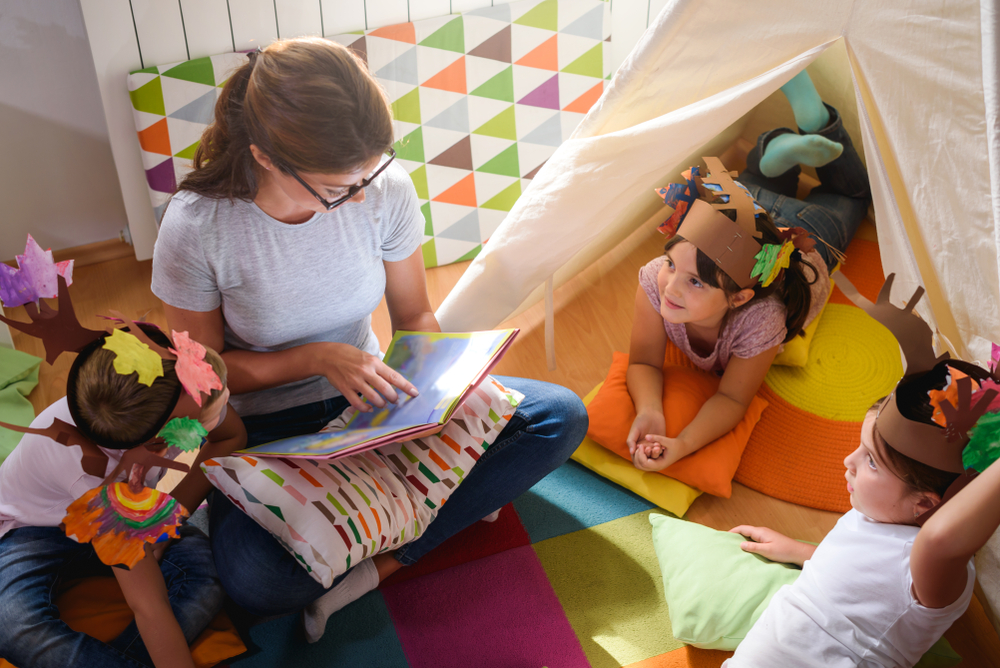
Many people wrongly believe that children don’t start reading until they reach the first grade or higher. And while, in some cases, this may be true, children can definitely start reading or at least learning to read before this stage, and they definitely should.
To set your child up for a successful future, start teaching basic reading comprehension skills as soon as possible, ideally even before they enter kindergarten.
This isn’t to say, of course, that your four year old should be reading novels, but they should ideally know the alphabet and, even more importantly, the sounds that each letter makes or can make. If you can instill your child with that basic knowledge prior to kindergarten, learning all of the other grade-level reading comprehension skills shouldn’t prove too difficult.
Play Games
At kindergarten or pre-kindergarten age, children have very short attention spans. To teach them anything, you’ll have to first get their attention and their focus. Thankfully, that’s not too hard to do if you understand how the four to five-year-old brain is wired.
Children at this age want instant rewards. They are impatient but curious. One of the best ways to appeal to them and to start teaching them reading comprehension in the process is to play some fun games.
Games that use cards, colorful parts, or other eye-catching items are ideal for kids at this level. That’s why flashcards work so well. You could create your own “flashcards” with pictures on one card and words on another and have your child match them up appropriately.
You could also try a fun dice game, where beginning sounds are on one die and finishing sounds are on another die. By playing this type of game together, your child can learn how some letters work together to form actual words and how others form “nonsense words.” With both real and non-real words, your child will learn to blend sounds and will also start to understand the basic composition of some of the most common words in the English language.
Of course, no matter what game you’re playing, it’s vital that you provide instruction and talk through each exercise to help your child identify key concepts from the game. Also, don’t expect your child to play for long. Those short attention spans mean that you can likely only play a game with desired results for 10 to 15 minutes at a time, but don’t give up. Every little bit of practice helps!

Read Together
Never underestimate the power of reading to and with your kindergarten-age child. Allow your child to pick stories at the library that interest them. Then, read these books together- and not just at bedtime when your child is sleepy.
Instead, pick a time each day to read a book together and then discuss it after. For best results, read the book yourself beforehand and come up with some basic comprehension questions to ask your child after you’ve read. Think of those “reporter questions:” who, what, when, where, why, and how.
Work with your child to uncover who the main characters in the story are, what happened to them, when it happened, where it happened, why it happened, and what it might mean or want to teach us, and how, exactly, it happened and in what order.
Your child may have trouble with some of these questions, but if you go back through the book together and point out key details, they’ll quickly start to understand how stories come together and make up a comprehensive whole, which is the entire basis of reading comprehension.
Discover New Words
While reading a story and understanding what is happening within it is definitely part of reading comprehension, you can’t expect your child to do that if they don’t know the meaning of half of the words that they’re reading. Thus, also devote plenty of time to learning and understanding new words
When you come across a word in a story or even out in the world that you think your child may not know, ask them. Ask them what the word means. If they don’t know, ask them what they think it means and why. Give them the real meaning when needed, and when possible, explain how the word is strung and formed together.
The word “firefighter” is a perfect example. It means someone who fights or fends off fires. When you show your child how these two meanings come together, this will spark higher-level cognitive reasoning and better reading and word comprehension, all while increasing your child’s vocabulary, which also contributes to better reading comprehension.
Get Outside Help with Reading Comprehension Apps
Finally, remember that you are not alone as you work with your child. To start with, your child’s teachers or future teachers will prove to be a great resource. They are the main ones doing the work to help your child build reading comprehension, and anything you do at home is just going above and beyond what your child is already learning at school.
Furthermore, there are many great online resources and apps, such as Readability, that fully understand how the young brain works and that are developed on those principles. This app, in particular, is great at encouraging children to read, making reading fun, and helping to build age and reading-level appropriate skills that will carry your child to a lifetime of success.
Try this app and take advantage of other resources, and before you know it, your child’s reading skills will blossom in major ways.

 Español
Español